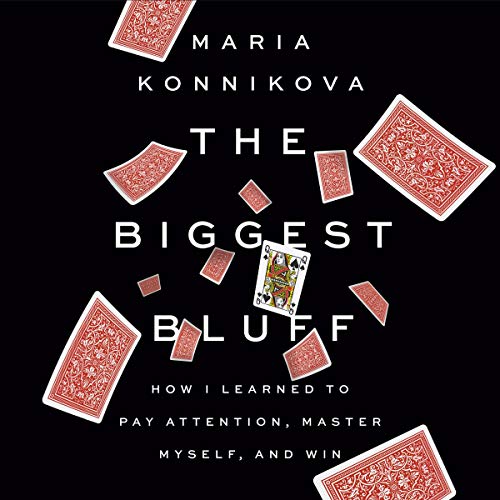
The Biggest Bluff:
How I Learned to Pay Attention, Master Myself, and Winby
by Maria Konnikova
Nonfiction
Penguin – June 2020
The memoir.
It’s a genre of nonfiction that, quite honestly, is a bit of a wildcard. When done poorly, memoirs can be superfluous exercises of vanity, incredibly dry reads, and thinly veiled instruments of agenda-pushing. Furthermore, for every insightful, sharply crafted, and timely memoir, there are about a dozen that are. . . well, not.
Luckily for us? Not only is The Biggest Bluff firmly in the former category, it is one of the most astute, intellectually challenging, and engrossing works I’ve read in recent memory.
The Biggest Bluff follows Maria Konnikova, a Columbia University PhD in Psychology and acclaimed writer, as she dove into the world of professional poker as a method to study human behavior, the role of chance in day-to-day life (and the fallacy that we can control all possible outcomes), and the factors that contribute to a person’s decision-making. Mentored by poker legend Erik Seidel, Konnikova was able to glean breathtakingly perceptive revelations into what makes us tick and the sociological factors that shape our critical thinking processes. She also became a poker star in her own right, transforming into a sponsored international champion with over $300,000 in tournament earnings.
Part chronicle of her ascension in the testosterone-addled poker industry, part academic dissection of game theory and its aforementioned psychological effects on human behavior, and part coming-of-age saga, there are about a million different ways The Biggest Bluff could have gone sideways from a reading perspective. There’s a lot going on here, structurally speaking. Yet Konnikova masterfully weaves all of these threads together to create a spellbindingly intelligent and thought-provoking tapestry, providing the literary world with a wonderful case study for how to shine in the memoir genre.
The answer? Voice.
There is cacophony of “heady” information peppered throughout the book—not easily digestible psychological studies and explanations of the rules, mechanics, and betting structures of poker, for instance. In the wrong hands, these sections could have been monotonous. But because Konnikova framed these parts through the accessible lens of her experience and journey, she makes the reader feel as though she is right alongside you, guiding you through. There is an intimate, familiar feel to her writing that is quite spectacular, seamlessly navigating the tightrope of being personable and yet not “schtick-y.” Even though it’s (obviously) very different in topic, genre, and medium, Konnikova’s prose reminds me a lot of Aaron Sorkin’s work on The West Wing. You are completely compelled by the story and characters the writers had laid out, but you’re also learning an incredible amount about the worlds the narratives are set in (psychology/poker and US politics, respectively) without it feeling preachy or jammed down your throat. That is an incredibly rare skillset for a scribe, and Konnikova wields it remarkably well.
There’s another x-factor that The Biggest Bluff possesses that makes it a sterling example of how to succeed in the memoir genre—or any genre, for that matter. It’s one that, frankly, is a bit hard to quantify in concrete terms, and is probably the most vital aspect of any creative work: emotional resonance. As someone who suffers from chronic anxiety and frustration over the lack of control I have in preventing bad things from happening in my life, The Biggest Bluff was an incredible eye-opener as to how I could begin to rewire my own brain in that regard. No, I’m not a professional poker player or an esteemed Ivy League PhD. But the beauty of the book is that you don’t need to be in order to takeaway its lessons and apply them to your own circumstances. There is a universal nature to The Biggest Bluff’s themes that allows it to bridge any and all gaps between Konnikova and her audience. Moreover, I felt uplifted and inspired after finishing the book—something that we can all use during these difficult times.
And that, dear readers, is the hallmark of a writer with true staying power. I plan on diving into Konnikova’s past works with immense curiosity and excitement, and eagerly await her next release.
You should, too.
